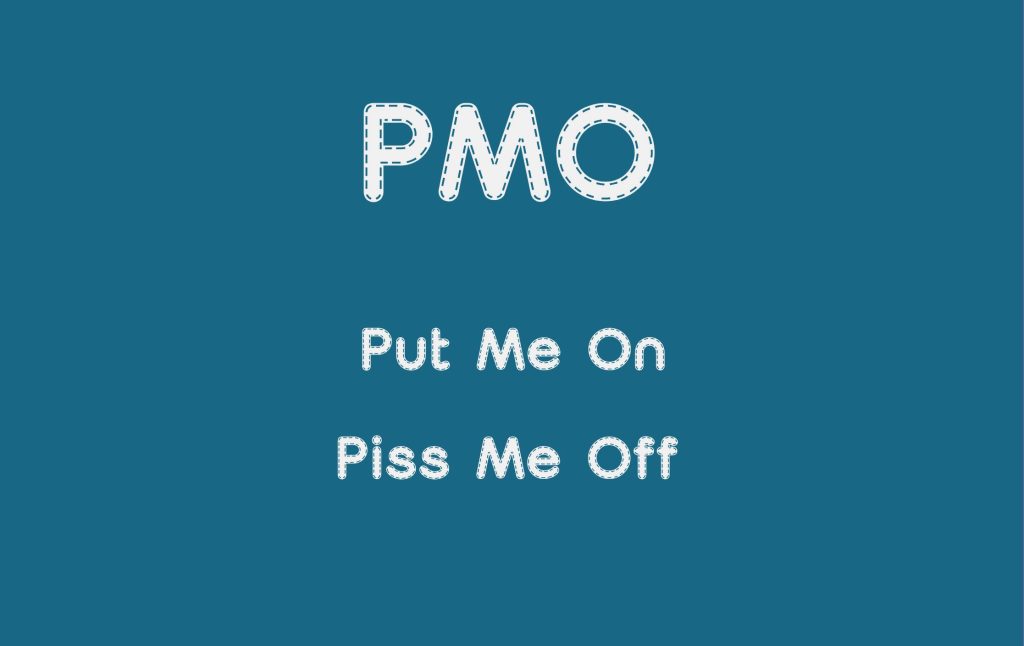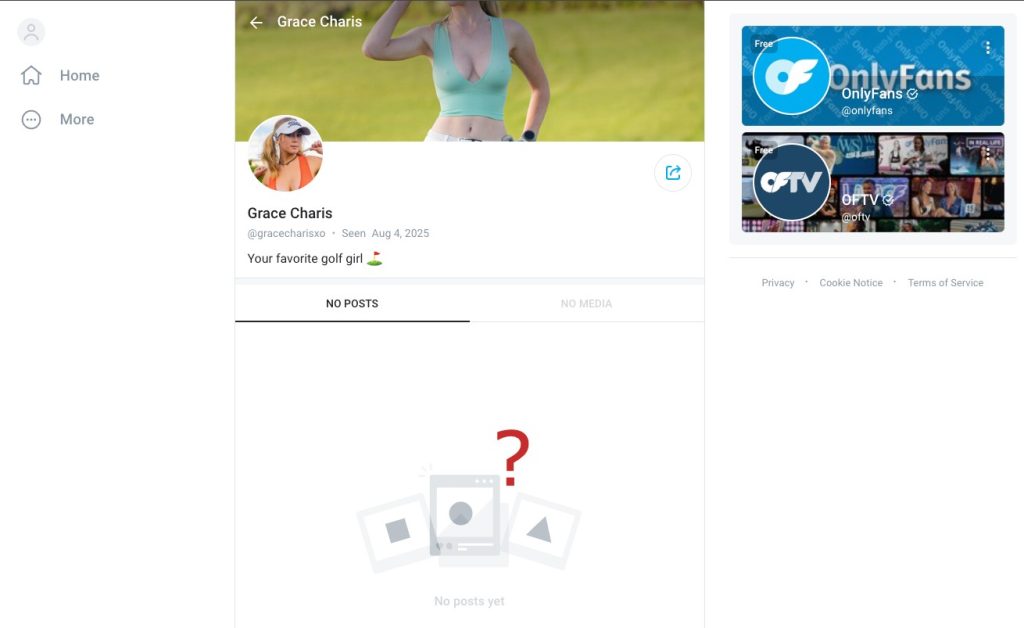The two most common meanings of PMO in text and on social media are “Put Me On” and “Piss Me Off.” Their meanings are different.
In texting conversations between friends or family members, both meanings of PMO are common:
- Asking for help: “Hey! Can you PMO with some Netflix recommendations?”
- Expressing frustration: “Ugh! My boss totally just PMOs me every day.”
So if you know these meanings, you can communicate better and avoid confusion when chatting online or texting friends.
Let me explain deeper what “Put Me On” and “Piss Me Off” means, how they’re used, how to respond, and more.
Put Me On

When someone uses PMO to mean “Put Me On,” they’re asking for help, a recommendation, or an introduction to something new. It’s like saying, “Can you connect me to this?” or “Can you share something cool with me?”
This usage has become especially popular on social media platforms like TikTok, Instagram, and Snapchat, where people often share tips, tricks, and recommendations.
For example:
- If someone texts you, “PMO to some good movies,” they’re asking for movie suggestions.
- On Instagram, a person might comment on a post saying, “PMO to your skincare routine,” meaning they want to know the products or steps you use.
The phrase “Put Me On” has roots in African American Vernacular English (AAVE) and has since spread widely into mainstream slang. It’s often used in a friendly or casual way to ask for advice or learn about something new.
“Put Me On” in Everyday Conversations
The phrase “Put Me On” is incredibly versatile and can apply to almost anything someone wants to learn about or try. Here are some common examples of how people use PMO in this context:
Music Recommendations
Music is one of the most common topics where PMO is used as people love sharing music recommendations with friends or followers on social media. Using PMO makes the request feel casual and fun. For instance:
- “I’m tired of my playlist. Can you PMO to some good songs?”
- “PMO to artists like Taylor Swift or Drake.”
Fashion Tips
Social media influencers often get comments like:
- “Your outfit is amazing! PMO to where you shop.”
- “PMO to those sneakers—they’re fire!”
In this case, the person is asking for advice on where to find similar clothing or accessories.
Food and Restaurants
Foodies also use PMO when they want suggestions for good places to eat or recipes to try:
- “I’m craving pizza—PMO to the best spot in town.”
- “That dish looks delicious! Can you PMO to the recipe?”
Life Hacks or Advice
Sometimes people use PMO when they want tips or tricks for improving their lives:
- “Your skin looks flawless! PMO to your skincare routine.”
- “I need help organizing my room—PMO with some hacks.”
TikTok creators often use PMO in captions or comments when sharing tips or recommendations:
- Caption: “PMO to this app—it makes editing so easy!”
- Comment: “Your makeup looks amazing! Can you PMO?”
On Instagram, users frequently comment with phrases like:
- “PMO where you got that dress!”
- “Your travel pics are stunning—PMO with your itinerary!”
On Snapchat, friends chatting casually on Snapchat might say things like:
- “Can you PMO with your playlist?”
- Or vent: “Ugh—this weather really PMOs me.”
Piss Me Off

The second common meaning of PMO is “Piss Me Off.” In this context, it’s used to express frustration, annoyance, or anger about something.
Here are two examples:
- If someone texts you saying, “My boss really PMO today,” they’re venting about a frustrating work situation.
- On Twitter, someone might post: “It really PMO when people chew loudly.”
Unlike “Put Me On,” which is positive and upbeat, “Piss Me Off” carries negative emotions. It’s often used when people want to complain about something that bothers them.
How to Use “Piss Me Off” in Conversations
When people use PMO as “Piss Me Off,” they’re usually talking about things that irritate them. When someone says “PMO,” they’re not just complaining, they’re looking for empathy or understanding from their friends or followers.
Here are some text examples:
1. Everyday Annoyances
Life is full of small frustrations that can make us feel annoyed. For instance:
- “It really PMO when my phone battery dies so quickly.”
- “Slow drivers on the highway always PMO.”
2. Personal Pet Peeves
Everyone has pet peeves—those little things that drive us crazy. People often use PMO to share these frustrations:
- “It PMO when people interrupt me while I’m talking.”
- “Seeing dishes left in the sink really PMO.”
3. Work-Related Frustrations
Work can be stressful, and many people vent their frustrations using PMO:
- “My coworker didn’t show up for their shift again—it totally PMO.”
- “All these last-minute deadlines are starting to PMO.”
4. Social Media Complaints
Social media itself can be a source of annoyance for some users:
- “Fake news on my feed really PMO.”
- “When people overshare their entire day online—it just PMO.”
How to Respond to PMO
Responding appropriately to PMO depends on its meaning in the given context. Whether someone is asking for recommendations (“Put Me On”) or expressing frustration (“Piss Me Off”), your response should match their tone and intention.
Responding to “Put Me On”
As mentioned above, when someone uses PMO as “Put Me On,” they’re looking for help or suggestions. Here’s how you can respond:
1. Acknowledge Their Request
Show that you understand what they’re asking for:
- “Sure! I’d love to help.”
- “Of course! Here’s what I recommend.”
2. Provide Specific Suggestions
You can tailor your response based on what they’re asking for:
- If they want music: “Check out Taylor Swift’s new album—it’s amazing!”
- If they want food: “You’ve got to try [Restaurant Name] downtown—it’s my favorite spot.”
3. Add a Personal Touch
A personal touch is to express why you like your recommendation:
- “I love this artist because their lyrics are so relatable.”
- “The pizza at that place is incredible—I go there all the time!”
4. Follow Up Later
If appropriate, check back with them later:
- “Did you get a chance to watch that show I recommended?”
- “How was the restaurant? Did you like it?”
Responding to “Piss Me Off”
When replying to “Piss Me Off,” your response should be empathetic and supportive:
1. Acknowledge Their Feelings
Validate their emotions so they feel heard:
- “I totally get why that would PMO.”
- “That sounds super frustrating—I’m sorry you’re dealing with that.”
2. Offer Support or Solutions
If possible, offer help or advice:
- “Is there anything I can do to help?”
- “Have you tried [solution]? It might help.”
3. Use Humor (If Appropriate)
Light humor can sometimes ease tension:
- “Wow, that would totally PMO anyone! Want me to send you some memes?”
4. Follow Up Later
Check in later if it seems serious:
- “Hey, how are things going now? Any better?”
Why Context Matters When Using PMO or Responding to PMO
The meaning of PMO depends entirely on the context in which it’s used. Without proper context clues, it can be easy to misunderstand what someone means by this acronym.
For example, if someone says, “PMO with some good books,” they clearly mean “Put Me On.”
But if they say, “These long meetings really PMO,” they’re talking about being annoyed (“Piss Me Off”).
To avoid confusion:
- Pay attention to the surrounding words in the message.
- If you’re unsure what someone means by PMO, don’t hesitate to ask for clarification.
- Consider using emojis or tone indicators (e.g., 😊 for positive meanings like “Put Me On,” 😡 for negative meanings like “Piss Me Off”).
Other Meanings of PMO
While “Put Me On” and “Piss Me Off” are the most common meanings of PMO in casual contexts, there are other interpretations depending on where it’s used:
- Post My Opinion
Some users might use PMO as an abbreviation for sharing thoughts online (e.g., posting opinions on forums). - Private Message Only
Occasionally used when someone wants a conversation kept private (e.g., DM-only chats). - Project Management Office
In professional settings (like workplaces), PMO refers to teams managing projects—but this meaning doesn’t apply much in casual texting!
These alternative meanings are less frequent but worth knowing if you encounter them.
Final Thoughts
PMO is a versatile acronym that adds personality and speed to conversations online and through text messages. Whether you’re asking someone to recommend something cool (“Put Me On”) or expressing frustration (“Piss Me Off”), understanding its meaning helps keep communication smooth.





